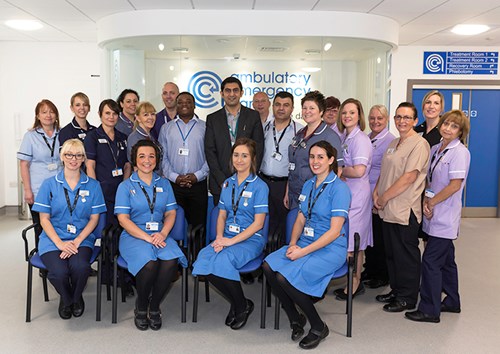
Ambulatory care is about providing same-day emergency care. Our Ambulatory Emergency Care Centre offers easy access to diagnostic tests and review by hospital consultants in one place. It is a way of providing safe care designed around the needs of patients. The service also aims to prevent unnecessary hospital admissions and provide a better experience for patients.
The service is not pathway or condition-led to ensure all patients can be considered. All patients must be referred and clinically accepted by the ambulatory emergency care team. The centre is focused on providing the right care for our patients, in the right place.
Four main groups of patients are seen in the centre:
Patients with medical conditions needing emergency care who are referred by their GP
Patients redirected from our emergency department
Patients who have been in hospital in the acute medical wards stepped down to support early discharge
Patients discharged from acute medical wards with outpatient investigations requiring review and possible further intervention
This is a day-treatment service so patients may be required to come back the following day.
Location
Royal Stoke University Hospital
Address
Ambulatory Emergency Care Centre
Trent Building
Royal Stoke University Hospital
Newcastle Road
Stoke-on-Trent
ST4 6QG
Telephone
01782 671700
GP referrals
01782 671500
Further contacts
Dr Zia Din, Clinical Lead for AEC
zia.din@uhns.nhs.uk
Mr Alan Bethell, Nursing Lead for AEC and Matron for Acute Medicine
alan.bethell@uhns.nhs.uk
Mrs Ruth Bradbury, Senior Sister for AEC
ruth.bradbury@uhns.nhs.uk
Opening hours
The centre is open Monday to Friday: 8am – 8pm
Referrals are accepted into the unit 8am-5pm
Frequently Asked Questions
What is ambulatory emergency care?
Ambulatory emergency care is a patient-focused service where some conditions may be treated without the need for an overnight stay in hospital. Patients will receive the same medical treatment they would previously have received as an inpatient.
The aim of this service is to provide patients with the care required to treat their condition during scheduled ambulatory care opening hours. They will be able to return home; if further treatment is required they will be asked to return to the unit to receive this.
What advantages does ambulatory emergency care offer?
The Ambulatory Care Unit provides a new way of ensuring that all our patients receive timely assessment. Despite not being admitted as an inpatient they will still have access to the same calibre of medical and nursing care that they would experience on one of our wards. If appropriate, they will be able return to their own home, even if further treatment is required on another day.
What can patients expect?
On arrival they will have an initial assessment within 15 minutes by a nurse or be reviewed by an acute care consultant. They may have a range of investigations and treatments arranged, the ultimate aim of which is to allow them to return home safely. We strive to deliver a compassionate, safe and reliable service.
During their visit the team will ask patients to fill in a short questionnaire to tell us about their experience of this service.
Will patients need to return to the hospital once they are sent home?
Patients may be asked to attend a clinic within the ambulatory emergency care centre or return to another hospital department for further investigations. An appointment for this will be given to them before they leave. If patients are unable to keep this appointment they should telephone us on 01782 671700 so that we can rearrange the appointment.
What should patients do if they feel unwell once they have returned home?
Patients should call 01782 671700 if they are concerned in any way about their condition once they return home.
